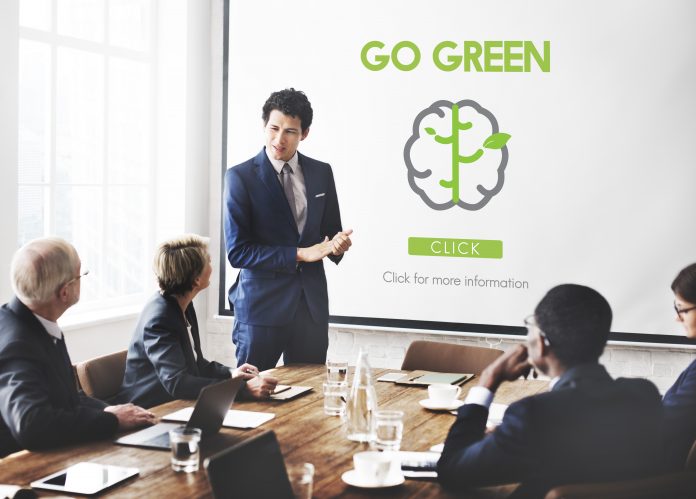
Sustainable business has gone from niche-market to must-have, as companies across the world realize that environmental responsibility is now expected from both consumers and investors alike. Put simply, sustainability is now part of future-proofing any company for long-term success and, in fact, the very future of our planet.
But how do you make your company more sustainable? How do you make real change and implement a vision that all stakeholders can work towards that will last in a fast-changing world? Well, one decisive factor is how you translate that goal into a language that is spoken throughout an organization, getting everyone on the same page through education, awareness, and collaboration.
Employee participation is at the core of sustainable transformation. Yet in a corporate setting, without a clear strategy and active participation, sustainability initiatives more often than not become someone else’s problem or a policy that is simply ignored. Everyone knows on some level that sustainability is important, but the challenge lies in having your entire team, from top to bottom, take ownership of it and become personally invested.
Education programs are the way to foster a shared mindset and equip staff with the knowledge they need to establish clear strategies that work towards sustainability goals across your entire company. Here we look at a basic framework of sustainability education programs that organizations can build to engage employees at all levels and achieve a comprehensive green vision.
Going green from the top
A company should lead by example in order to get employees truly on board with sustainability initiatives, as staff are more likely to support and act on these initiatives themselves when they’re certain that the company is honest and genuine in its drive to become more sustainable.
This stands in contrast to greenwashing, the practice of claiming green credentials that do not exist and allows your company to truly engage with sustainable practice. To achieve this, executives and managers need to take a positive leadership role as the face of the company, acting as role models for employees to follow.
To avoid slipping into the “not my problem” mindset, education at this level should focus on how improved sustainability is relevant and beneficial for the organization. Reinforce the ethos of “sustainability is good” with specifics, such as how the company impacts people and the environment, the financial benefits of sustainability, and the growth opportunities it provides.
Training should touch on how to utilize management and planning methods such as the PDCA cycle, backcasting and SMART goals to establish and hone sustainability goals. It should also provide employees with clear targets that they can work towards on a regular basis.
In addition to this, managers armed with this knowledge are better equipped to prioritize sustainability when making larger decisions. They can develop goals and benchmarks, as well as guide and encourage other employees by finding ways to communicate the concrete benefits of sustainability. Real progress boosts motivation, and you need to lead from the front.
Creating a strong foundation
As we’ve mentioned, engaging employees is vital, not only will they make organizational sustainability a reality on a day-to-day basis, but also provide valuable insights into issues that might be missed on a managerial level. Working on the “front lines”, they have the expertise required to improve the effectiveness of a plan and put it into action while also providing new insights into how your company can improve.
The goal of sustainability training for employees is twofold: to get everyone on the same page and to establish a sense of personal commitment that encourages thinking about how they can integrate sustainability into their daily duties. Education beginning with basics like climate change and recycling facts establish a foundation of knowledge that can be honed and made more relevant by brainstorming how operations in their own department affect or are affected by the environment, and what changes can be made to work towards the company’s overall sustainability goals.
For new employees, sustainability education can be easily integrated into onboard training, offering the perfect opportunity to foster a green company culture from the bottom up. In fact, for years now sustainable corporate practices have been a desirable attribute actively sought by key talent, and have also been cited as a factor that improves employee retention. Integrating sustainability into introductory training sends a powerful message and provides a solid base for initiatives to grow and succeed.
Going beyond fundamental sustainability education for all employees, the next stage is to offer further training opportunities for those who are particularly motivated to make things happen. One common and effective strategy is appointing volunteer sustainability champions in each department who can lead initiatives and help guide their fellow employees.
Relevant additional training options can vary depending on the type of company or industry but could include anything ranging from courses on zero waste to LEED education—or even a combination of different programs. Today, almost every sector has industry-specific frameworks to work towards, so a little research will provide you with the resources and guidance you need.
Following a basic framework such as this, introducing sustainability education within a company is a proven way to make fast and effective progress towards achieving environmental goals. With environmental sustainability having firmly established itself within the public consciousness, and local and national governments finally getting serious about climate change, now is an essential time to get your whole organization on board so you don’t get left behind.




